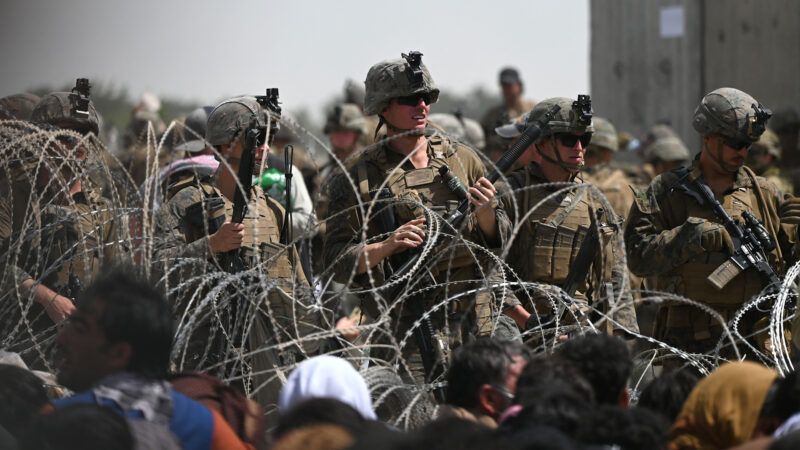[New Tang Dynasty, Beijing, August 20, 2021]As the sky changes in Afghanistan, the US government has come forward to ensure that the relationship with its allies is as solid as a rock. The United States withdraws its troops from Afghanistan in order to transfer strategic resources from the Middle East to the Indo-Pacific. What practical actions have it taken recently? We connect with reporter Wang Yuhe and ask her to introduce.
The United States withdrew its troops in Afghanistan, and the Taliban quickly occupied Afghanistan. The incident caused a global shock. The “enemy” of the United States uses this to mock the United States, frighten and instigate its allies, in an attempt to arouse their concerns about the military support and reliability of the United States.
At this time, the US government showed firm support for its allies. US State Department spokesperson Ned Price (Ned Price) said on Wednesday (August 18), “We are investing in NATO and investing in the Indo-Pacific region in a way that surpasses previous administrations.” “You see our support. Partners, whether it is Taiwan, Israel, or any other country, these entities have rock-solid partnerships and commitments with us.”
The outside world generally believes that US strategy and resources have shifted from the Middle East to the Indo-Pacific, and that the withdrawal from Afghanistan is to better focus on responding to threats from the CCP.
We can see that in the Indo-Pacific region, from August 2 to August 27, the US Army, Navy, Air Force and Marine Corps, together with the British, Australian, and Japanese forces, held the “2021 Large-scale Global Exercise” (LSGE21) , Is one of the largest exercises since the Cold War, involving dozens of warships and submarines, the simulation is to seize and control the western Pacific islands.
The US government has also been supporting Taiwan’s self-defense capabilities through arms sales. The US announced on August 4 that it had approved the sale of a batch of weapons to Taiwan with a total value of approximately US$750 million.
On August 18, President Biden was interviewed and asked about the CCP’s mocking that Taiwan “cannot rely on the United States“, Biden also retorted, saying that the United States will respond if Taiwan is invaded. Biden stated that “the United States has made a sacred commitment to Article 5 (the NATO founding treaty). If anyone invades or takes action against our NATO allies, the United States will respond, and it will be the same for Japan, South Korea, and Taiwan. This is fundamentally (and Afghanistan) cannot be compared.” This is Biden’s clearest statement on the defense of Taiwan since he took office at the end of January.
In response to changes in the situation in Afghanistan, President Tsai Ing-wen recently stated that “Taiwan’s only option is to become stronger and more united, thereby enhancing our determination to protect ourselves.” “We cannot choose to do nothing and rely on others to protect it.” Analysis According to the source, this information shows that Taiwan will be consistent with the United States, but will not be overly dependent.
In addition, the United States has also stated recently that it has no intention of reducing its troops stationed in South Korea or Europe. The United States and South Korea will begin annual joint military exercises this week. In Japan, Japanese Prime Minister Yoshihide Suga stated on the 17th that Japan will work closely with the military ally, the United States.
After the Biden administration came to power, it has cooperated with allies through politics, diplomacy, and military affairs, hoping to unite with allies and curb the threat of the CCP.
Under the Quartet Security Dialogue, the United States is cooperating more closely with Japan, India, and Australia. The leaders of the four countries are scheduled to hold their second meeting this fall, and the Quartet naval exercises will be held this year.
Let’s take a look at the military activities of various countries in the South China Sea under the leadership of the United States.
Recently, the British Queen Elizabeth crossed the South China Sea, and the Japanese Maritime Self-Defense Force “Seto Mist” destroyer crossed the Vietnamese sandy islands. India is about to send a task force into the South China Sea for a two-month deployment. Even Germany stated on August 2 that it would send a warship to the South China Sea. This is the first time that Germany has joined the ranks of other Western countries in 20 years and has expanded its military presence in the South China Sea. And now, the United States and Indonesia have launched a strategic dialogue relationship, and the two countries have just held the largest joint military exercise in history between the two countries. France has already sent the amphibious assault ship Raiden and the Lafayette-class frigate to the South China Sea this year.
The U.S. withdraws its troops from Afghanistan, and the CCP takes this opportunity to sow discord. But now, all parties have seen that the strategic foundation for the United States to unite its allies has been laid. The situation in Central Asia without the help of the US military will only make the CCP’s heart beat. The CCP has launched a blood-based “Belt and Road” project. In this region, I am afraid that it will fall into endless trouble.
Comprehensive report by NTD reporters Wang Yuhe and Yuwei
The URL of this article: https://www.ntdtv.com/gb/2021/08/20/a103194755.html
